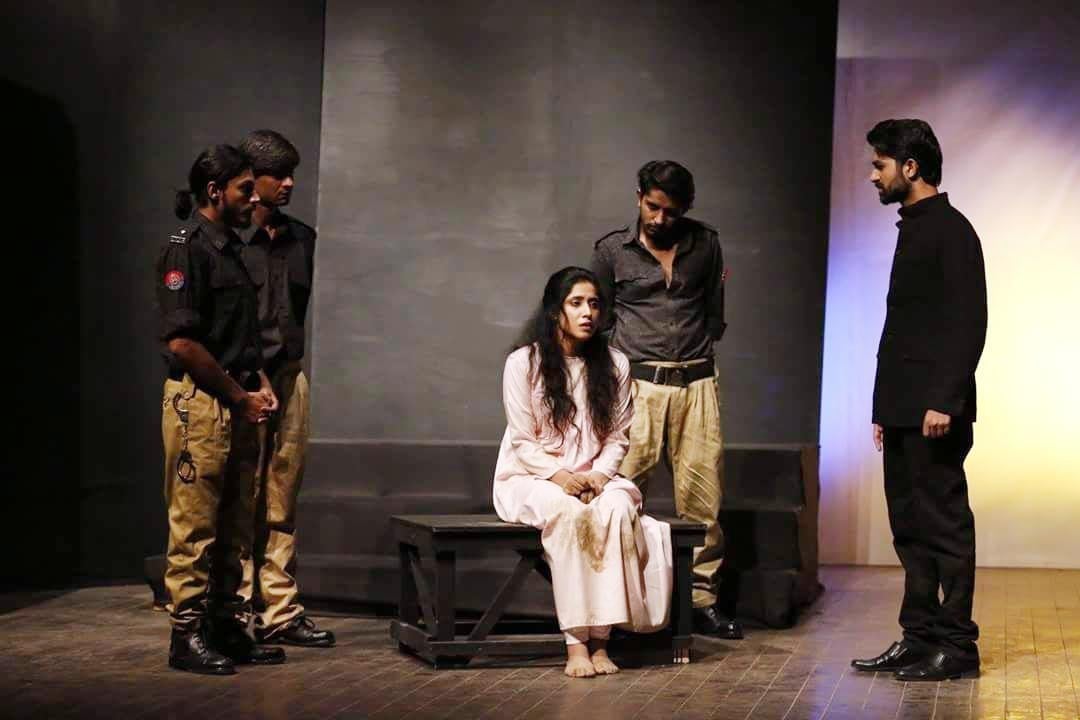
This April Karachi saw the performance of two plays of social relevance, one an adaptation of the Greek play Antigone and the other an original production tracing the history of Pakistan’s political upheavals

Last fortnight saw Karachi host two plays which while being far apart in their style and genre resonated with the same themes; resistance and hope.
Antigone the ancient Greek play by Sophocles (written and first performed around 442 BC) is translated and directed by Khalid Ahmad and was performed at T2F by the outgoing class of NAPA. This play is a translation from a 1943 adaptation by the French dramatist Jean Anouilh. According to Khalid Ahmad, Anouilh made the classical play contemporary and was performed by anti-fascist resistance groups during the Nazi invasion of France.
The play opens with the Chorus (Ahmad), introducing the story and its characters to the audience; here is Antigone, daughter of Oedipus and sister to Eteocles and Polynices who died fighting each other for the throne of Thebes after Eteocles had refused to give up the crown to his brother as their father had ordered. Thebes is now ruled by their uncle Creon whose son Haemon is Antigone’s fiancé. Other characters are Esmene, Antigone’s sister, their nurse, the three watchmen, the messenger and Creon’s wife Eurydice.
The Chorus sets the tone of the play, it’s a tragedy of course, the young Antigone will die because she will transgress her uncle Creon’s authority and order. With both brothers dead, Creon has ordered that Eteocles (whom he supported) be given a proper funeral with all the state pomp and fanfare while Polynices’ mortal remains are to be left in the open to rot and become scavenger fodder. Whosoever tries to bury Polynices will die.
The play is about Antigone’s act of revolt, and what she thinks is her moral duty; she cannot live and let her brother’s body rot so she defies the king’s orders and covers up the body with her bare hands and is caught by the watchmen when she returns to finish what she started.
Creon and Antigone’s argument over this act of defiance forms the crux of the play; the king tries to convince her that she has so much to look forward to - marriage to his son, children. When she pays no heed, Creon entreats that the throne is not a responsibility that he wanted but in the absence of any good leaders, it is a burden he bears with reluctance for the people of Thebes. Antigone does not relent, her truth is defiant in the face of death and she is sent to be buried alive. But she does not die alone, Haemon has hid himself in the cave where she is to be walled in and dies with her. His mother kills herself on hearing this and Creon is left a lonely broken man.
The young NAPA cast were excellent especially Antigone (played by two actresses, Ayesha and Sehrish) and Creon (Irfan) who performed and delivered complex lines with great maturity and aplomb.
The Urdu translation and adaptation of Antigone was first performed in 1986 in Karachi at a time when dissent against authorities was still covert. Plays like Galileo, Antigone and others were metaphors for resistance and free thought. "My Antigone of today is Sabeen and Parween Rehman who died for a cause that they believed in" said Khalid Ahmad and one just cannot help but think that in more than three decades, little has changed.
Zard Patton ka Bann is a play by Theatre Wallay, an Islamabad-based company that performed in PACC Karachi in early April. Part of a project called "on Common Grounds", it is based on real and lived experiences in post 9/11 Pakistan.
It was developed in collaboration with theatre specialists from Oregon Shakespeare Festival and Ithaca College Department of Theatre Arts, and was performed at the Oregon Shakespeare Festival and Artists Repertory Theatre Portland in June/July 2017. The team then rewrote the play in Urdu for local audiences. This version has been performed in Islamabad and is now on tour.
The theme - the shriveling up of cultural and public spaces - in present day Pakistan was told in an engaging manner using classical music (sitar and tabla jugalbandi), video, songs and of course through banter amongst the actors and monologues.
In Zard Patton ka Bann we are taken through the major historic upheavals of the past 18 years - bombings, sectarian killings, dharna politics, media shenanigans, religious intolerance, displacement and environment degradation - all serious issues but told with humour and zest so that the hour and half did not rest heavy. There were somber moments, the Easter bombing and the APS tragedy, but the underlying tone was of hope. The play’s strength is in its writing made up of every day conversation we have all had which makes it relatable, the black humour we have learnt to use as self-preservation in the face of regular bombings. Its importance lies in its exposition of the moments that have shaped this country and the lives of those who live in it. The fact that it ends on a hopeful and optimistic note makes it an important treatise to be performed in schools and colleges as much as possible.